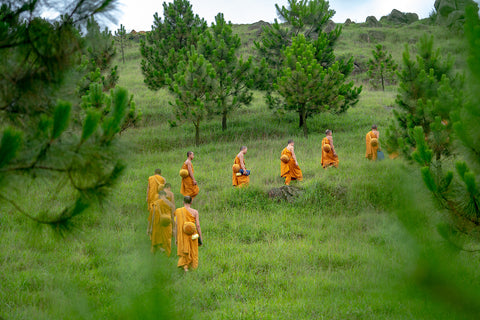Sit in such a way that you feel light, relaxed, happy, and free. Many of us have so many anxieties and projects that weigh heavily on us. We carry our past sorrows and anger and they become a kind of baggage that makes life heavy. Sitting meditation is a way to practice letting go of the things we carry needlessly. These things are nothing but obstacles to our happiness. Ease in our sitting and ease in our breathing nourishes the body and mind.
When we are calm, we can look deeply into a difficult emotion to see its roots and understand it better. First, we nourish ourselves with the joy of meditation, calming the breath, body, and thoughts. Then we embrace the difficult feeling. This brings some relief and gives us a more solid basis for investigating and transforming the difficulty so we can get the healing we need.

Finally, we can explore if our emotion is based on something happening in the present or something that we are still attached to from the past. If it’s from the past we can begin to let it go, to more truly see and experience the present moment. — Thich Nhat Hanh

In Living Without Stress or Fear, beloved Zen Master Thich Nhat Hanh presents six sessions of his core teachings as well as many guided meditation practices. In this 6 CD set, he shares this message of hope: that we can find freedom from the grip of emotions like anxiety, anger and despair. Through techniques such as “mindful breathing” and “begin anew” practice, we can learn to purposefully expand our abilities to dwell in the state of peaceful clarity.

Zen Master Thich Nhat Hanh is a Vietnamese Buddhist monk, poet, scholar, and human rights activist. In 1967, he was nominated by Martin Luther King, Jr., for the Nobel Peace Prize. On 11 November 2014, a month after his 88th birthday, Thich Nhat Hanh suffered a severe stroke. Although he is still unable to speak, and is mostly paralyzed on the right side, he has continued to offer the Dharma and inspiration through his peaceful, serene and valiant presence. Thich Nhat Hanh is currently residing at Từ Hiếu Temple in Vietnam where he ordained with his teacher when he was sixteen years old. He has expressed a wish to stay there for his remaining days. The thichnhathanhfoundation.org suggests that we can honor him by practicing engaged Buddhism such as volunteering at a food bank or animal shelter, hosting a community gathering or a workplace meditation, donating to a local non-profit, or offering a smile to a homeless person.


2 comments
My gratitude for this simply explained and deep teaching. It is thanks to teachers like Thich Nhat Hanh that I rediscovered and fully appreciated my Judeo-Christian roots.
Than you for this teaching. I was unaware that Thich Nhat Hanh has endured a stroke. I hold him in prayer and love. I am a Roman Catholic Sister and a Zen Teacher in the line Sanbo Zen (principle Zendo in Kamakure Japan).